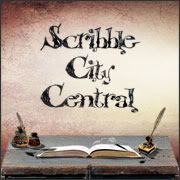But where was I? Ah! Having a Tweetexchange with the lovely Keren David, whose excellent debut novel, When I Was Joe, was published by Frances Lincoln earlier this month. We had covered several topics (including our shared love of Georgette Heyer) when we moved on to the subject of writing habits. I was twitting about how important it was to CLEAR THE DECKS before starting, when she replied with this: "That's something I need to learn - I'm too apt to just plunge in....Never make notes. Am useless at planning or thinking ahead. Just see where it takes me." And it started me thinking.
Are you a PLUNGER or a PLANNER?
I used to be a PLUNGER. I'd jump straight into the millstream of story, gripped in the jaws of my plot and the Story Gods, and paddle frantically to wherever they took me. Then, later, I'd need to know who did what to whom when and where and what their hair colour was and whether they had three eyes in chapter four or five and when-did-the-scales-appear and
OH-GOD-I'VE-LOST-THE-SCRAPS-OF-PAPER-I-HAD-SOMEOFITWRITTENDOWNONANDI'MGOINGTOKILLMYSELFBECAUSEICAN'TREMEMBER
ANYOFITANDIT'SGOINGTOTAKEDAYSTOFINDITALL. Get the picture? I've never been one of those annoying people who can remember the 44-line poem they wrote 15 years ago and recite it verbatim. My brain has always been forgetfully middle-aged. Not senile, you understand. Just a little...absent-minded. It's all that creative stuff going on in my head, of course. So now I PLAN. The story is knocking on the door of my brain, wanting to hurtle out and lick me all over. But there are PREPARATIONS to be made first. Here's how it goes:
- First I clean/clear the desk and office of dirty teacups, cloudy glasses with suspicious grey things growing in the bottom, sticky rings of who-knows-what (but possibly Ribena or limejuice), crumbs, old dog bones, dead insects, dust, odd socks, uneaten-so-stale chocolate-covered snacks and pieces of cake (a VERY small item, this), 104 random books in a tottering pile, post-it notes with mysterious telephone numbers scribbled among forgotten must-remembers, redundant piles of proofs, my missing wedding-present earrings (thank god I found THOSE before the Wanton Toast Eater asked why I wasn't wearing them), plus other revolting or unnecessary ephemera. I'll also do filing, tax returns (if it's that time of year--new projects always seem to start in January) and general tidying. Never underestimate the power of a little selective desk de-cluttering (or Office Feng Shui if you're posh). It clears the mind wonderfully. And it makes me feel less of a slattern.
- Phew! So that's it? Let slip the dogs of story.... NO! Wait. The FOUR ALL IMPORTANT FILES come next. I make a folder on the computer with the book's working title into which will go (along with the working copy) the following files:
- FILE 1: CHARACTERS: Every character will be put here as they arrive in the book, along with their physical characteristics, who they are related to, and any quirks, likes, dislikes and useful information like how many legs they have. I might also, later on, group them into categories. Humans/Fairies/Gods/Monsters etc. Even if I don't use it in the book itself, I need to know who they are and what they are like. And of course, I can refer back to it when that dodgy memory of mine lets me down as to whether they have green eyes or blue on page 43.
- FILE 2: PLACES: Whether I'm writing about a real place or a fantasy otherworld, I need to know where things are. How far is it from Wyrmesbury to Vesterton? That's something I didn't know when I wrote Hootcat Hill, and I needed to. And doing the mapping for Atticus and Melissa's journey through the real landscape of the Greek myths was far more of a nightmare than it needed to have been if I had written down stuff as I went. So in here go towns, cities, streets, roads, landmarks and everything else remotely geographical. People who can draw might make paper maps. I can't and don't, and I haven't learnt how to do it on the computer. Yet.
- FILE 3: TIMELINE: Oh God! The timeline and its importance cannot be overstated. Where something happened is important, but WHEN is just as vital. It took me days of angst and panic and sleepless nights to disentangle the complexities of the timeslip passages and exactly when the when on both sides of the door was in Hootcat Hill, BECAUSE I HADN'T KEPT NOTES. Continuity is vital--and you can be sure that if you get it wrong some beady-eyed reader will take pleasure in telling you so. You just hope the beady-eyed reader is your editor, or it can be embarrassing.
- FILE 4: REFERENCE: In here goes every weblink, book and page reference I look at for a book, whether it's useful or not. The point is, I might want it again. And if it's not here I won't be able to find it. There was one reference in Atticus the Storyteller about eggs and onions being left at crossroads as an offering to Hecate on a certain feastday. Guess what? I didn't write down where I found the reference, and it caused me no end of trouble and tearing of hair to find it again. Lesson learnt.
- CHAPTER SKELETON PLANS
- and that dratted all-important SYNOPSIS

















8 comments:
I am a planner. Not so much that my characters can't breath or move or direct themselves, but I know in which direction the story should go. It surprises me once and a while though.
ann
Glad to hear I'm not the only scatterbrain in the business [types he as his keyboard see-saws on a pile of unopened credit card bills]. This post came at the right moment as I have just started working on a full length novel. Thanks!
I'm definitely a plunger first - and then bits of planning happen as I go along. But first I'm gripped by an idea, a story, a character and I have to leap headlong, no matter the state of the desk before the whole thing wings away. Stories, I've learned, aren't always willing to stick around and wait. If I faff around too long, if I try to plan upfront, the thing just flits off. So for me, it starts with carpe diem - or rather, carpe story!
With my latest manuscript, I found it incredibly useful to keep a character list that featured names (why do I find it impossible to remember what even main characters are called!) and physical characteristics (green eyes, or blue), and how people are related. I referred back to this time and again. It particularly helps with minor character consistency as it allows them to feature as and when needed to build a credible extended community around your main characters. Whose names I can never remember...
Chapter plans and synopsis! That's what I need help with...waiting with bated breath.
Plan? What's that again?
No, Like Nicky I PLUNGE right into the story, no idea what story it is or who it's about or where it will take me.
After a while I do force myself to stop and look back at it; to see what my characters know, who they are, who they have issues with (love, hate, resent etc). I get them to tell me in a sort of long rant which can be really informative.
Often at that point I know where it is all going to end, but I've rarely got any idea of what will happen in between - that's what makes it fun and keeps me going- I need to find out.
I do recognise that "Oh! %>*^%^%&!!! Where did I put that bit of information I desperately need?" moment. But I'm just not very good at being organised for more than five minutes.
What a lovely lot of comments--really nice to see what others do. Thank you all very much for taking the time. I must emphasise that ONLY AT THE BEGINNING of a book am I properly organised. Thereafter, as you see from the amount of post-book rubbish clearance I have to do on the desk, everything goes to pot as I plunge through the story (but I do put all those things I mentioned into the sacred Files as I go). @Keren Looks like a post on Chapter Planning and Synopses had better be next then. Sigh. I can see this Twitterwisdom post is NEVER going to get written!
I am a plunger who became a planner and now I'm a planner! It makes for work at the beginning of a project but it also makes it much easier to write day to day if you know where you're going and what you're doing.
Post a Comment